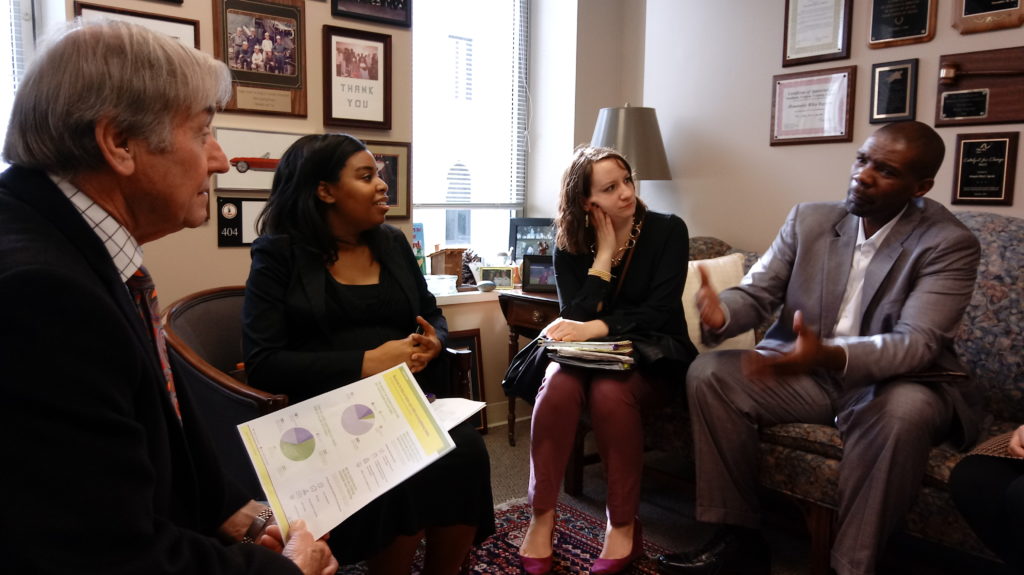

We are excited to share that Virginia lawmakers passed legislation to create the Kinship Guardianship Assistance Program (KinGAP) in the 2018 legislative session! It now awaits the governor’s signature by April 9. The program, which will be administered by the Virginia Department of Social Services, will officially start July 1. We want to thank the patrons and co-patrons of the bills:
In the Senate SB 636: Sen. Siobhan S. Dunnavant (chief patron) and Sen. Barbara Favola (chief co-patron)
In the House HB 1333: Del. Emily Brewer (chief patron), Del. Christopher Peace (chief co-patron), and Del. Karrie Delaney (chief co-patron)
In 2008, Congress passed the Fostering Connections to Success and Increasing Adoptions Act of 2008, which provides opportunities to promote permanency and improve outcomes for children in Virginia’s foster care system. Five years ago, KinGAP legislation was first introduced in the Virginia General Assembly, but at the time, legislators were cautious about providing financial assistance to relatives.
Over the next few years, Voices successfully advocated for extended supports for children in foster care with the Fostering Futures Program. Youth from around the commonwealth shared their stories of being in Virginia’s foster care system, and lawmakers began asking questions about what could be done to prevent youth from aging out of care. Kinship care has been proven to reduce the number of children in foster care and increase the number of children who find permanent homes before they reach age 18.
In 2018, Voices again advocated for the passage of KinGAP, this time receiving bipartisan support from members in both chambers. KinGAP started with four bills and was eventually trimmed down to two companion bills in the House and Senate. In the House, Del. Emily Brewer brought her personal experience of being adopted to the bill and shared openly with members how important it is that Virginia improve our permanency numbers. The greatest hurdle was getting KinGAP out of House Appropriations, where it has historically died.
Voices and Virginia Poverty Law Center hosted the first-ever Kinship Care Advocacy Day, where we invited organization partners and directly impacted families to speak with lawmakers on the Health, Welfare, and Institutions and Appropriations Subcommittee about the concept of kinship care and urge them to support a bill creating KinGAP. We were ecstatic when the bill passed out of this subcommittee a few weeks later and even more thrilled when both the House and Senate included the small financial requirement for KinGAP in their proposed budgets.

Left to right: Del. Riley Ingram, Allison Gilbreath of Voices, and Christy Horsley of CASA Central Virginia listen to foster care graduate Carl Price.
The Title IV-E Kinship Guardianship Assistance Program is a formula grant that helps states that opt to provide guardianship assistance payments for children who enter foster care and are placed with a relative. Children will be eligible for Title IV-E foster care maintenance payments if they have resided in the home of the prospective relative guardian, who was licensed or approved as meeting the licensure requirements as a foster family home, for at least six consecutive months.
Families can use KinGAP payments for:
● Respite care
● Day care
● Parenting classes
● School supplies, activity fees
● Clothes
● Furniture
● Costs associated with filing for guardianship
● Driver’s education for older children
● Time off from work for court appearances, visits to schools, visits to social services, travel costs (the court with jurisdiction over the child may be far away from the relative’s home)
Who is eligible?
In order for a family to be eligible for KinGAP, the child must be related by blood, marriage, or adoption to the person designated as the foster parent; the child must have been placed with the relative for six consecutive months; and the options of reunification with the birth family or adoption must have been ruled out. The relative must demonstrate a commitment to permanently caring for the child.
While many families take in relative children, ONLY those children who were first in foster care placement with the kinship guardian would be eligible. Children who come to live with relatives through other pathways would not be.
Why is it important?
● Promotes a sense of belonging and helps children stay connected to family and their culture
● Increases stability and continuity
● Prevents children from remaining in foster care when reunification and adoption are not appropriate permanency options
● Reduces agency supervision and intervention in children’s lives once they are in a permanent family
● Does not require the termination of parental rights for children who have relationships with parents who cannot care for them
● Provides assistance to relatives to care permanently for children
We are incredibly grateful for the sponsors of this legislation and the bipartisan support it received. However, passage of this legislation would not have been accomplished without the advocacy of directly impacted families. Many graduates of the foster care system shared their personal experiences with legislators. One such advocate was Carl Price, who shared his traumatic experience of being in foster care while receiving cancer treatment. A relative was willing to take him in had finances not been an issue.
Many organizations also actively supported this legislation. In particular, we want to recognize Virginia Poverty Law Center, Formed Families Forward, Children’s Home Society, Connecting Hearts, the League of Social Service Executives, Virginia’s Kids Belong, and CASA of Central Virginia for your support of KinGAP for the past several years!
We also want to thank staff at the Virginia Department of Social Services for being such strong advocates and responding to endless questions!
Kinship bills attract attention of new delegates – WCVE, Jan. 30, 2018
In the General Assembly, real life experience makes a difference – Daily Press, Feb. 15, 2018
An Advocacy Success Story – Richmond Family Magazine, March 30, 2018
Also, check out our story about KinGAP advocate Chloe Edwards!
Read More Blog Posts